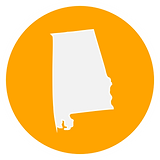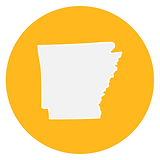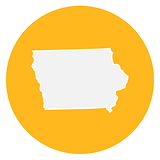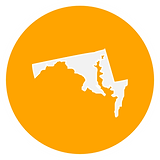
Happening in the States
ALABAMA
ENABLE ALL HIGH SCHOOLS TO OFFER CS
Act 389 (2019) required all high schools, middle schools, and elementary schools to offer computer science by the 2020–2021 school year.
FUND CS PROFESSIONAL DEVELOPMENT
Alabama has allocated funding for CS professional development.
CREATE HIGH-QUALITY CS STANDARDS
Alabama has developed rigorous K–12 computer science standards.
ARKANSAS
ENABLE ALL HIGH SCHOOLS TO OFFER CS
Act 187 (2015) required all high schools to offer computer science by the 2015–2016 school year.
FUND CS PROFESSIONAL DEVELOPMENT
Arkansas has allocated funding for CS professional development.
CREATE HIGH-QUALITY CS STANDARDS
Arkansas has developed rigorous K–12 computer science standards.
ARIZONA
ENABLE ALL HIGH SCHOOLS TO OFFER CS
Arizona does not yet require that all secondary schools offer computer science.
FUND CS PROFESSIONAL DEVELOPMENT
Arizona has allocated funding for CS professional development.
CREATE HIGH-QUALITY CS STANDARDS
Arizona has developed rigorous K–12 computer science standards.
HAWAII
ENABLE ALL HIGH SCHOOLS TO OFFER CS
Act 51 (2018) required all high schools to offer at least one computer science course by the 2021–2022 school year.
FUND CS PROFESSIONAL DEVELOPMENT
Hawaii has allocated funding for rigorous computer science professional development and course support.
CREATE HIGH-QUALITY CS STANDARDS
Hawaii has adopted rigorous K–12 Computer Science Standards.
INDIANA
ENABLE ALL HIGH SCHOOLS TO OFFER CS
SEA 172 (2018) required all elementary, middle, and high schools to offer computer science by the 2021–2022 school year.
FUND CS PROFESSIONAL DEVELOPMENT
Indiana has allocated funding for CS professional development.
CREATE HIGH-QUALITY CS STANDARDS
Indiana has developed rigorous K–12 computer science standards.
IOWA
ENABLE ALL HIGH SCHOOLS TO OFFER CS
Arizona does not yet require that all secondary schools offer computer science.
FUND CS PROFESSIONAL DEVELOPMENT
Arizona has allocated funding for CS professional development.
CREATE HIGH-QUALITY CS STANDARDS
Arizona has developed rigorous K–12 computer science standards.
MARYLAND
ENABLE ALL HIGH SCHOOLS TO OFFER CS
HB 281 (2018) required all high schools to offer at least one computer science course by the 2021–2022 school year and asks each school board to make efforts to incorporate computer science in each elementary and middle school.
FUND CS PROFESSIONAL DEVELOPMENT
Maryland has allocated funding for CS professional development.
CREATE HIGH-QUALITY CS STANDARDS
Maryland has adopted rigorous K–12 computer science standards.
MISSOURI
ENABLE ALL HIGH SCHOOLS TO OFFER CS
Missouri does not yet require that all secondary schools offer computer science.
FUND CS PROFESSIONAL DEVELOPMENT
Missouri has allocated funding for CS professional development.
CREATE HIGH-QUALITY CS STANDARDS
Missouri has adopted rigorous K–12 computer science standards.
NEW JERSEY
ENABLE ALL HIGH SCHOOLS TO OFFER CS
A2873 (2018) required all high schools to offer a course in computer science by the 2018–2019 school year.
FUND CS PROFESSIONAL DEVELOPMENT
New Jersey has allocated funding for CS professional development.
CREATE HIGH-QUALITY CS STANDARDS
New Jersey has developed rigorous K–12 computer science standards.
NORTH CAROLINA
ENABLE ALL HIGH SCHOOLS TO OFFER CS
North Carolina does not yet require that all secondary schools offer computer science.
FUND CS PROFESSIONAL DEVELOPMENT
North Carolina has allocated funding for CS professional development.
CREATE HIGH-QUALITY CS STANDARDS
Arizona has developed rigorous K–12 computer science standards.
NORTH DAKOTA
ENABLE ALL HIGH SCHOOLS TO OFFER CS
North Dakota does not yet require that all secondary schools offer computer science.
FUND CS PROFESSIONAL DEVELOPMENT
North Dakota does not yet provide dedicated funding for rigorous computer science professional development.
CREATE HIGH-QUALITY CS STANDARDS
North Dakota has adopted rigorous K–12 computer science standards.
PENNSYLVANIA
ENABLE ALL HIGH SCHOOLS TO OFFER CS
Pennsylvania does not yet require that all secondary schools offer computer science.
FUND CS PROFESSIONAL DEVELOPMENT
Pennsylvania has allocated funding for CS professional development.
CREATE HIGH-QUALITY CS STANDARDS
Pennsylvania has endorsed rigorous K–12 computer science standards.
SOUTH CAROLINA
ENABLE ALL HIGH SCHOOLS TO OFFER CS
South Carolina Department of Education revised the list of courses that satisfy the computer science graduation requirement, effectively requiring all high schools to offer at least one computer science course by the 2018–2019 school year (with waivers available until the 2020–2021 school year) and requiring all students to take at least one credit of computer science to graduate.
FUND CS PROFESSIONAL DEVELOPMENT
South Carolina has allocated funding for CS professional development.
CREATE HIGH-QUALITY CS STANDARDS
South Carolina has developed rigorous K–12 computer science standards.
VIRGINIA
ENABLE ALL HIGH SCHOOLS TO OFFER CS
HB 831 (2016) added computer science into the Virginia K–12 Standards of Learning, which all schools must implement.
FUND CS PROFESSIONAL DEVELOPMENT
Virginia has allocated funding for CS professional development.
CREATE HIGH-QUALITY CS STANDARDS
Virginia has developed rigorous K–12 computer science standards.
WASHINGTON
ENABLE ALL HIGH SCHOOLS TO OFFER CS
SB 5088 (2019) required that each school district that operates a high school must provide access to an elective computer science course by the 2022–2023 school year.
FUND CS PROFESSIONAL DEVELOPMENT
Washington has allocated funding for CS professional development.
CREATE HIGH-QUALITY CS STANDARDS
Washington has adopted rigorous K–12 computer science standards.














